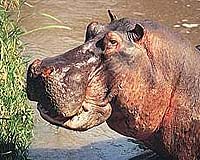| . |  |
. |
Hamilton, Canada (SPX) Sep 14, 2009 The smell of recent death or injury that repels living relatives of insects has been identified as a truly ancient signal that functions to avoid disease or predators, biologists have discovered. David Rollo, professor of biology at McMaster University, found that corpses of animals, from insects to crustaceans, all emit the same death stench produced by a blend of specific fatty acids. The findings have been published in the journal Evolutionary Biology. Rollo and his team made the discovery while they were studying the social behavior of cockroaches. When a cockroach finds a good place to live it marks the site with pheromone odours that attract others. In trying to identify the precise chemicals involved, Rollo extracted body juices from dead cockroaches. "It was amazing to find that the cockroaches avoided places treated with these extracts like the plague," says Rollo. "Naturally, we wanted to identify what chemical was making them all go away." The team eventually identified the specific chemicals that signaled death. Furthermore, they found that the same fatty acids not only signaled death in ants, caterpillars, and cockroaches, they were equally effective in terrestrial woodlice and pill bugs that are actually not insects but crustaceans related to crayfish and lobsters. Because insects and crustaceans diverged more than 400-million years ago it is likely that most subsequent species recognize their dead in a similar way, that the origin of such signals was likely even older, and that such behaviour initially occurred in aquatic environments (few crustaceans are terrestrial). "Recognizing and avoiding the dead could reduce the chances of catching the disease, or allow you to get away with just enough exposure to activate your immunity," says Rollo. Likewise, he adds, release of fatty acids from dismembered body parts could provide a strong warning that a nasty predator was nearby. "As explained in our study, fatty acids-oleic or linoleic acids-are reliably and quickly released from the cells following death. Evolution appears to have favoured such clues because they were reliably associated with demise, and avoiding contagion and predation are rather critical to survival." The generality and strength of the phenomenon, coupled with the fact that the fatty acids are essential nutrients rather than pesticides, holds real promise for applications such as plant and stored product protection or exclusion of household pests. Share This Article With Planet Earth
Related Links McMaster University Darwin Today At TerraDaily.com
 Hippo kills poaching soldier in DR Congo park
Hippo kills poaching soldier in DR Congo parkKinshasa (AFP) Sept 12, 2009 A hippopotamus killed a member of Democratic Republic of Congo government forces at Virunga National Park while he was fishing illegally, a local environmental NGO said Saturday. Bantu Lukamba of the IDPE non-governmental organisation told AFP that Private Sebagendi was killed Thursday when he was fishing along with five other people on Lake Edward in spite of a fishing ban. "As he could ... read more |
|
| The content herein, unless otherwise known to be public domain, are Copyright 1995-2009 - SpaceDaily. AFP and UPI Wire Stories are copyright Agence France-Presse and United Press International. ESA Portal Reports are copyright European Space Agency. All NASA sourced material is public domain. Additional copyrights may apply in whole or part to other bona fide parties. Advertising does not imply endorsement,agreement or approval of any opinions, statements or information provided by SpaceDaily on any Web page published or hosted by SpaceDaily. Privacy Statement |